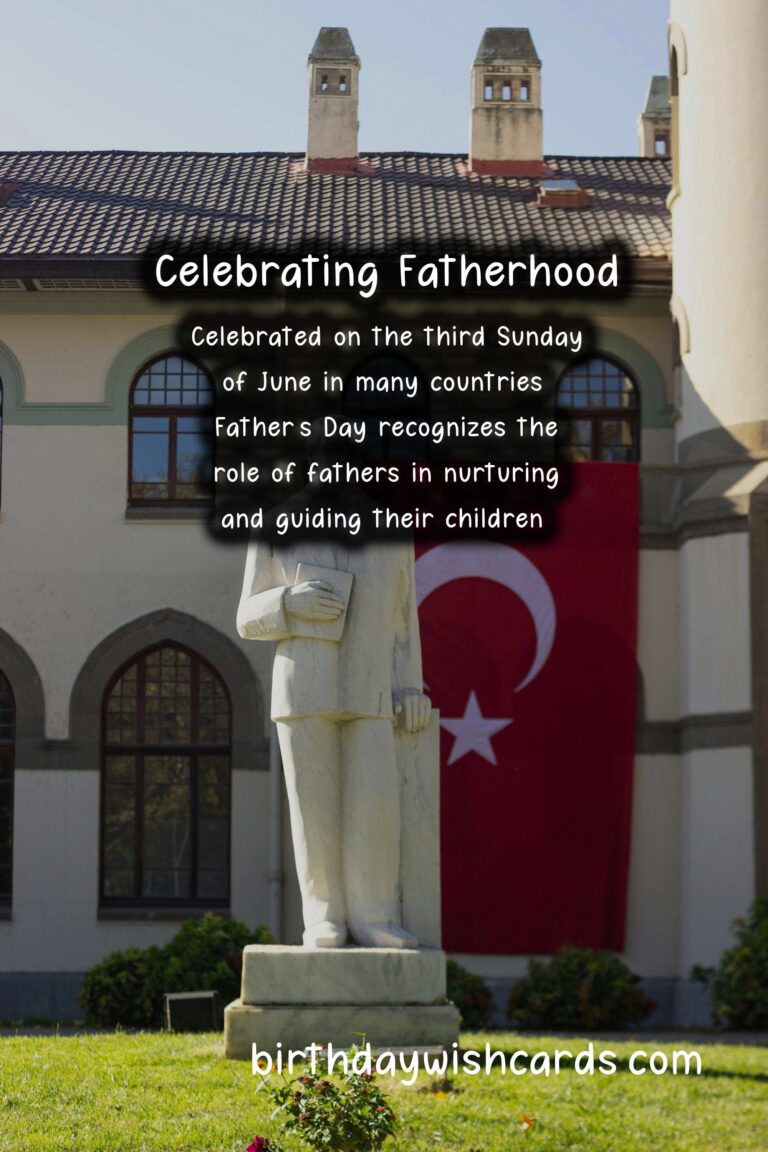
Father’s Day is a special day dedicated to honoring fathers and father figures around the world. Celebrated on the third Sunday of June in many countries, Father’s Day recognizes the role of fathers in nurturing and guiding their children. This article delves into the rich history and significance of this beloved holiday.
Origins of Father’s Day
The concept of Father’s Day can be traced back to ancient civilizations that held fatherhood in high regard. For instance, the Babylonians celebrated a day in honor of fathers over 4,000 years ago. However, the modern celebration of Father’s Day as we know it today has its roots in the early 20th century.
The First Modern Father’s Day Celebration
In 1908, a woman named Sonora Smart Dodd from Spokane, Washington, became inspired to create a holiday to honor her father, William Jackson Smart, a Civil War veteran who raised her and her siblings alone after the death of their mother. Dodd’s initiative gained traction, and in 1910, the first official Father’s Day was celebrated in Spokane.
Official Recognition
Following the success of the initial celebration, efforts to establish Father’s Day as a national holiday gained momentum. In 1924, President Calvin Coolidge advocated for the holiday to become a national observance, but it wasn’t until 1972 that Father’s Day was officially recognized as a national holiday in the United States by President Richard Nixon.
Global Celebrations
Today, Father’s Day is celebrated in various countries around the world. While the United States marks the occasion in June, other countries have different dates and customs. For instance, in many Catholic countries, Father’s Day is celebrated on March 19, the feast day of St. Joseph, the earthly father of Jesus.
The Significance of Father’s Day
Father’s Day serves several important purposes. It provides an opportunity for children to express their gratitude and love for their fathers. The day can foster communication and strengthen family bonds as well. Additionally, it raises awareness about the vital role fathers play in the well-being of their children and families.
Traditions and Celebrations
Traditions surrounding Father’s Day vary greatly from one culture to another. Many families celebrate with special meals, gifts, and activities. Common gifts include ties, tools, and tech gadgets. Some families choose to partake in outdoor activities such as fishing or golfing, while others may opt for more low-key celebrations at home.
The Role of Fathers in Society
Fathers play a crucial role in shaping their children’s lives and, by extension, society as a whole. Research has shown that involved fathers contribute positively to their children’s emotional, social, and cognitive development. Father’s Day serves to acknowledge and encourage active fatherhood.
Observing Father’s Day in the Digital Age
In recent years, social media has transformed how we celebrate Father’s Day. Many people use platforms like Facebook and Instagram to share heartfelt messages, photos, and memories with their dads. This digital celebration enables families to connect even when they are miles apart.
Conclusion
Father’s Day is not just a day for gifts and celebrations; it is an important occasion that reminds us of the invaluable contributions fathers make in our lives. It is a day to recognize their sacrifices, love, and commitment. As we celebrate Father’s Day each year, let us take a moment to appreciate the fathers and father figures who have influenced our lives for the better.
Father’s Day is a special day dedicated to honoring fathers and father figures around the world. Celebrated on the third Sunday of June in many countries, Father’s Day recognizes the role of fathers in nurturing and guiding their children. 













